Mofaz: Iran gives Hizbullah $100 million a year: Israeli defense minister threatens use of force against lebanonThe Daily StarJan. 24, 2006 |
Popular 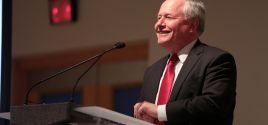
Bill Kristol: My Fellow White Americans Are 'The Enemy'
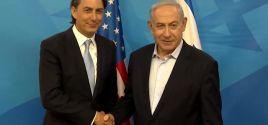
Biden's Lebanon Envoy, Ex-Israeli Soldier Amos Hochstein, Gave Israel 'Green Light' to Invade Lebanon
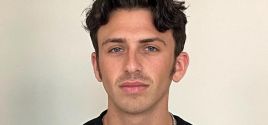
Israel Detains American Journalist for Reporting on Damage from Iran's Strikes [UPDATE]
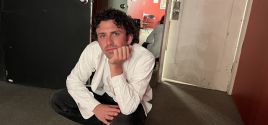
Journalist Jeremy Loffredo Released After Four Days in Israeli Detention, Ordered Not to Leave
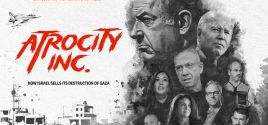
WATCH: New Film 'Atrocity Inc' Exposes How Israel Lied About October 7th to Justify Genocide
 Israeli Defense Minister Shaul Mofaz has claimed Hizbullah receives $100 million a year from Iran and accused the group of channeling some of these funds to Palestinian factions engaged in a violent confrontation with the Jewish state. Speaking Saturday in Herzliya, north of Tel Aviv, Mofaz said: "Iran gives Hizbullah $100 million per year and part of this money goes to Palestinian terrorist groups." The minister also threatened to use force against Lebanon in case of an escalation along its northern border, Lebanese newspapers reported. "It is in Israel's interest to preserve the calm along its northern border but if the escalation continues then we will know how to respond," Mofaz was quoted as saying in An-Nahar newspaper. Hizbullah members were unavailable for comment. The defense minister's comments came one day after he accused Iran and Syria of being behind a Palestinian suicide attack in Tel Aviv that wounded 19 Israelis. He said the attack was financed by Tehran, planned in Syria and carried out by Palestinians. Mofaz described a meeting this week between Syria's Bashar Assad and Iranian President Mahmoud Ahmadinejad as the "terror summit." During his Damascus visit the Iranian president also met Hizbullah leader Sayyed Hassan Nasrallah and the leader of 10 radical Palestinian factions including Islamic Jihad chief Abdullah Ramadan Shallah, whose faction claimed the Tel Aviv bombing. Hizbullah and its weapons have been firmly in the spotlight recently, coming under heavy fire from Lebanese and international figures - especially after its ministers suspended their participation in the government. From a group linked to some of the worst violence of the 1980s, to a potent force and a mainstream political party, Hizbullah has managed to reinvent itself over the years and assure its survival as a strong player in Lebanon's complex politics. But the resistance group may now be facing its greatest challenges because of the collapse of Syrian power in Lebanon and the political upheaval in a country trying to wean itself from decades of Syrian tutelage. Syria has been Hizbullah's prime backer. An open and serious discussion is underway in Lebanon about the future of Hizbullah's weapons. The unanimous public support it gained in recent years is visibly declining. Hizbullah was seen as the first Arab force to be able to militarily push Israeli troops out of Arab land, when the Israeli Army withdrew from Southern Lebanon. And as the luster of that event fades, the group's national credentials and allegiance are being questioned by many among Lebanon's new anti-Syrian majority, who maintain the group serves the policies of Syria and Iran. Internationally, a 2004 UN Security Council resolution demands that Hizbullah disarm. Nevertheless, Hizbullah remains one of the main political forces in Lebanon. It has 11 legislators in the 128-member Parliament and the group - branded as a terrorist organization by the United States - has joined the Cabinet for the first time. It's a far cry from the days of the 1980s when the group was accused of holding Western hostages and blowing up U.S. and French military targets in Beirut, killing hundreds. Since the Syrian troop withdrawal in April after nearly three decades of controlling Lebanon, Hizbullah has been seen by anti-Syrian politicians who now control the government as having one foot in Beirut and the other in Damascus. The anti-Syrian bloc worries that Hizbullah has become the Lebanese extension of an anti-U.S. regional front comprising allies Iran and Syria. "Those who liberated the South from Israel must show allegiance to Lebanon," anti-Syrian politician Walid Jumblatt said recently, referring to Hizbullah's guerrilla war that succeeded in driving Israeli troops out of Lebanon in May 2000, ending an 18-year occupation. "We do not want to be in the middle of an axis that starts in the Mediterranean and ends in Tehran. We do not want to be a barricade for [Iran's] nuclear facilities," Jumblatt said. While it reluctantly supported an international investigation into Hariri's assassination, it has criticized the UN commission's work and has refused to back the Lebanese government's demand for an international tribunal in the case. It also has rejected the disarmament of pro-Syrian Palestinian guerrillas, who maintain bases south of Beirut and in eastern Lebanon. When Cabinet on December 12, put to a vote the request for an international tribunal into Hariri's killing, overruling Hizbullah's objections, the five ministers representing Hizbullah and Amal, another allied Shiite group, walked out of the 24-member, half-Muslim, half-Christian Cabinet and have not returned, precipitating a political crisis. It was unprecedented for Hizbullah, which built its reputation on fighting Israel, to be accused of treachery amid hints by Jumblatt that they may have had a hand in a series of bombings and assassinations of anti-Syrian politicians and journalists last year. Hizbullah has rejected the accusations, maintaining it was being attacked because it refuses to join in the campaign against Syria. "Was their martyrdom to defend Syria and Iran? They were on Lebanon land fighting an enemy," Hizbullah leader Sayyed Hassan Nasrallah said, referring to the hundreds killed fighting Israel in Lebanon. "Isn't it shameful to tell the families of the martyrs that your children had no allegiance to their nation?" The group's charismatic leader accused U.S. diplomats of scuttling Lebanese attempts to end the political standoff. In a lengthy television interview Wednesday, the cleric disclosed that he wanted the government - as a means of ending the crisis - to declare that "the resistance is not a militia" as a way to resolve the current crisis. Many in the government are wary of making such a statement because it would put Lebanon in direct confrontation with the United Nations. Nasrallah said he was open to discussions on the future of Hizbullah's weapons, a potent arsenal of thousands of rockets that the group maintains it has created as a "balance of terror" in the border standoff with Israel. Hizbullah says its weapons are deterrence against future attacks by Israel, which twice invaded Lebanon in 1978 and 1982. Since the Israeli withdrawal in 2000, Hizbullah has continued to fight Israel over a disputed patch of land on the border where Syria, Lebanon and Israel meet. "Our goal is how to protect Lebanon. Let us agree on a formula that protects Lebanon and we are ready to discuss the weapons," Nasrallah said. The simmering tensions between pro- and anti-Syrian camps in Lebanon came to a head-on confrontation earlier this month, when security forces clashed in Beirut with a small group of Hizbullah and other pro-Syrians protesting a U.S. envoy's visit. Seven policemen and four protesters were injured. Defiantly, some thousands of demonstrators then staged a peaceful protest near the U.S. Embassy to press their demand for end to what they called U.S. meddling in Lebanese affairs. Ibrahim Bayram, an analyst with Lebanon's leading An-Nahar daily, said Hizbullah is searching for new game rules following the Syrian withdrawal. "Whether there is a Syrian agenda or not, whether there is an Iranian agenda or not, Hizbullah feels it is being sidelined and oppressed by the [anti-Syrian] majority," he said. Hizbullah may have common interests with Syria and Iran, but it is trying to distinguish itself from them and acquire a Lebanese agenda, he said. "For them, it's a fight for survival and they are engaged in self-defense." - Agencies |



